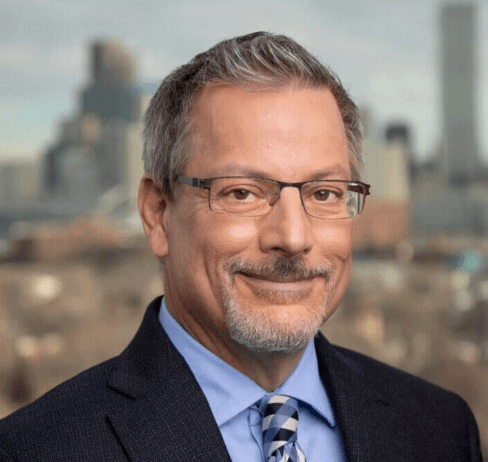Five Minutes With David Nisivoccia
 David Nisivoccia
David Nisivoccia
The HAND network is hard at work to address the growing housing affordability challenge across the Capital Region. Five Minutes With is a series highlighting these members and other stakeholders. This informal conversation delves into their recent projects, the affordable housing industry, and more. In this edition, we had the pleasure of chatting with David Nisivoccia, Executive Vice President and Chief Operating Officer of Volunteers of America National Services. Take a look at our dialogue below.
HAND: Congratulations on your new role with Volunteers of America (VOA)! Tell us more about your background and your organization’s work.
David: I’m happy to be returning to the DMV, having grown up in Northern Virginia. I’ve spent most of my career working on behalf of public housing authorities, including Fairfax, San Antonio, and most recently serving as the Executive Director of the Denver Housing Authority. I’m just wrapping up my first 100 days in this position at VOA, and I’m already amazed at the breadth and depth of housing, healthcare and human services provided by the team. I’ve had the opportunity to travel across the country, visiting our programs and housing sites, and a key commonality across these communities is the consistent undersupply of affordable housing.
Founded in 1896, Volunteers of America is a national, faith-based nonprofit organization that serves more than 1.5 million people in 46 states, the District of Columbia and Puerto Rico. VOA National Services is a wholly owned affiliate and one of the nation’s largest nonprofit providers of quality affordable housing, with a portfolio of 13,000 units across 38 states and Puerto Rico, as well as senior healthcare facilities and other related community health programs.
HAND: Having worked all over the country, you certainly have seen the housing landscape in different markets. What are some of the trends you have noticed?
David: More than 20 million American renters today are burdened with housing costs. As a result, the average family is extremely sensitive to economic volatility and is even susceptible to homelessness should their household face acute financial challenges. This is especially true here in the District and the surrounding region. With significantly more of the average household’s income going toward housing, that means less money is available for transportation, groceries, healthcare, childcare, and especially savings that could protect folks in times of crisis. Affordable housing is one of the most significant societal challenges of our time – and we aren’t going to build our way out of it fast enough using traditional methods or doing business as usual.
HAND: What are some of the biggest challenges when it comes to building more affordable housing for those priced out of the current market?
David: The National Multifamily Housing Council estimates that 4.3 million new rental homes are needed by 2035 to meet the demand. The challenges are stark: rising interest rates and construction costs, tumultuous equity markets, strong opposition to densifying neighborhoods, limited soft funding and oversubscribed bond cap, an overwhelmed and under-resourced workforce. We must use every single tool in the toolbox, and invent new ones that address the challenge from both the supply and demand sides. We need both carrots and sticks … accelerated entitlements and expedited permitting; efficiently-designed housing; modular and manufactured housing solutions, and new capital stacks that can work well together. And we need new partnerships, and opportunities for mixed-use projects that leverage capital markets and affordable housing programs.
HAND: There certainly is no shortage of challenges facing our sector. What is Volunteers of America doing here in the Capital Region to increase the supply of supportive affordable housing?
David: In partnership with Hoffman & Associates, D.C. United, and the D.C. Government, Volunteers of America is thrilled to relocate our national headquarters into the emerging Buzzard Point neighborhood of Southwest D.C., where we will bring together more than 100 full-time employees, co-located with 110 units of deeply-affordable senior housing operated by Volunteers of America National Services. Of these units, 69 out of 110 units will be set aside for seniors earning 30 percent AMI or less, which we believe is the most critical tier of residents to house.
We are currently exploring strategies to implement best-in-class technology supports to help address social determinants of health. The building is designed to achieve LEED for Multifamily certification, and every single unit will be accessible, allowing residents to age in place and take advantage of built-in infrastructure as their mobility and health needs change. The project also will include market rate multifamily and retail. We are excited to expand our reach in the District of Columbia and bring our national expertise to support local initiatives in the city.

HAND: Why is it important for Volunteers of America to move from your current headquarters in Northern Virginia into the District of Columbia, at Buzzard Point?
David: In a time of significant office vacancy and hybrid work, Volunteers of America will bring a commercial office presence to DC, as one of our greatest strengths as an organization is being “in-community,” leveraging relationships, trust and connections in the communities we serve. We recognize the value of human connection, as that is what we do every day with the people we serve. Co-locating our staff teams with affordable housing and services in the District is a reflection of our commitment to ensuring we are “in-community,” connected on a daily basis to the communities we live in, work in and have the pleasure to serve. We plan to continue our work as a public policy partner and thought leader in advocacy efforts around affordable housing, making our voices heard and ensuring policies work well for industry practitioners like yourselves.
I look forward to growing our presence in the DMV, and working with all of you to answer the call for meeting the region’s affordable housing needs.





Trackbacks & Pingbacks
[…] more here.HAND is a nonprofit membership collective working across the private, public and social sectors to […]
Leave a Reply
Want to join the discussion?Feel free to contribute!